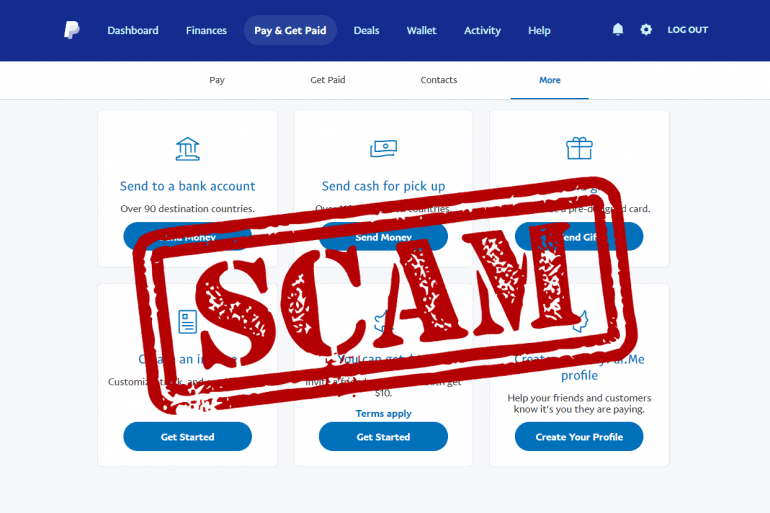As selling your used stuff online has become commonplace, so have scams taking advantage of people by using the names of reputable online companies.
Here are some of the most common PayPal scams out there so you can play it safe — especially if you’re selling large items (such as a refrigerator, sofa or other furniture, car, boat, RV, wheelchair, mobility scooter) that the seller wants to pick up locally.
Based on an article by Christina Tusan – Attorney, FTC Bureau of Consumer Protection
It’s a scam! Tips that someone’s trying to steal from you or rip you off
One reader writes: “Within an hour of posting our RV for sale on Craigslist, we got a text from a deaf woman who wanted to buy it as a gift for her son at asking price, sight unseen, via PayPal.
“We texted her back to say we’d take a cashier’s check only, and that we won’t sell it to anyone sight unseen.
“She wrote back that her job and disability kept her from coming to see it or go to the bank, but she’s ready to pay right now — and if he doesn’t have a PayPal account, it’s really easy to set one up.”
Sadly, this type of scenario isn’t uncommon, and you are right to be suspicious.
What’s really going on? It’s often a ruse to steal your money, merchandise or personal information — or all three.
How many Paypal scams work
The scam generally goes like this: You post a high-value item, like a used car, for sale online — such as on a Facebook group or Craigslist.
In no time at all, you get an email from a buyer willing to pay full price — or more! They don’t even need to see the item in person.
However, they set conditions: They are only willing to pay by PayPal (or maybe even Venmo, Cash App or Zelle), and/or insists the sale must happen right away.
A note about using Paypal to sell to local buyers
An important note to begin: PayPal is a reliable service — but only for certain types of transactions.
First off, their Seller Protection terms specifically say that they do not offer seller protection for vehicles, “including, but not limited to a motor vehicle, motorcycle, recreational vehicle, aircraft or boat.”
Another key point from the PayPal terms: Seller Protection also doesn’t apply to items picked up locally or in person.
The rule: “It involves an item that you deliver in person, including in connection with a payment made in your physical store…”
The one exception: “…unless the buyer paid for the transaction in person by using a PayPal goods and services QR code.”
To qualify for Seller Protection, whatever you’re selling must be a physical, tangible item that can be shipped and you must ship to the address on the Transaction Details page — and you must have proof of shipment.
These rules also mean that most intangible items, such as services and downloads/digital goods, are not covered. (Check their site for details of the Seller Protection terms.)
How to avoid some common Craigslist & PayPal scams
Here are a few of the suspicious situations to look for and steps to safe selling online:
PayPal scam scenario 1:
The buyer claims they can only pay via PayPal. Don’t have a PayPal account? No problem, he says. They’ll send you an email with a link so you can set one up.
What should you do? Don’t take the bait. The link will actually send you to a website pretending to be PayPal. Any information you enter will be collected by the bogus buyer, and may be used to commit fraud. If you need to set up an account, go directly to PayPal.com.
PayPal scam scenario 2:
“Check your email!” The buyer claims he has sent payment to your PayPal account with additional funds so you can ship the merchandise ASAP… but oops — he sent too much money. He asks you to return the extra money via a money wiring service. If the buyer claims to have sent extra money, and asks for some back, that’s a big red flag that you’re being played.)
It’s all a lie.
What should you do? Log into your PayPal account. Make sure you’ve been paid before you ship. Never click or follow links in emails from people you don’t know.
The safest approach is to open a new browser window, type PayPal.com, and log in yourself.
PayPal scam scenario 3:
The buyer sends you real money through a real PayPal account, and you ship him the car. The problem is — as you find out later — the account belongs to someone else!
You might need to return the money — even though the scammer now has your wheels.
What to do if you’ve been scammed
If you have been scammed, contact PayPal and ask them to open an investigation, and file a complaint with the FTC and your local police department.
Then, if you can bring yourself to do it, tell your friends and family about what happened. Hopefully, you can help keep the same thing from happening to them.
Newer scams: Don’t pay for things with gift cards
If someone calls you with something for sale, urgent news or a convincing story, and then pressures you to pay them with a gift card — like an iTunes, Google Play, Steam, Kroger, Walgreens, BestBuy, Amazon, CVS or Rite Aid gift card –and then tells you to give them the codes on the back of the card, stop. It’s almost certainly a scam.
These cards are like giving cash – and that money is practically untraceable, unless you are lucky enough to be able to act immediately.
The FTC says that as of 2018, gift cards are the number one payment method that imposters demand. They might pose as IRS officials and say you’re in trouble for not paying taxes; or a family member with an emergency; or a public utility company threatening to shut off your water; or even a servicemember selling something before deployment.
They might even call with great news – you’ve won a contest or a prize! But to get it, you need to pay fees with a gift card.
Scammers will say anything to get your money. And they know how to play into your good nature, desire to help, hopes, fears and sympathies. They like gift cards because, once they’ve got the code on the back, the money is gone and almost impossible to trace.
If you bought a gift card and lost money to a scammer, immediately contact the company that issued the card. Call or email iTunes, Target, Amazon or whatever merchant it was from, and tell them that one or more of their gift cards was used in a scam.
Have all of the code numbers available. If you act quickly enough, they might be able to stop the redemption and get you your money back.
Bottom line: If someone says that to get money or payment you have to first give them money — or merchandise or a gift card or your car — it’s a scam.
So remind your parents and tell your teens: If it seems too good to be true… it probably is.









